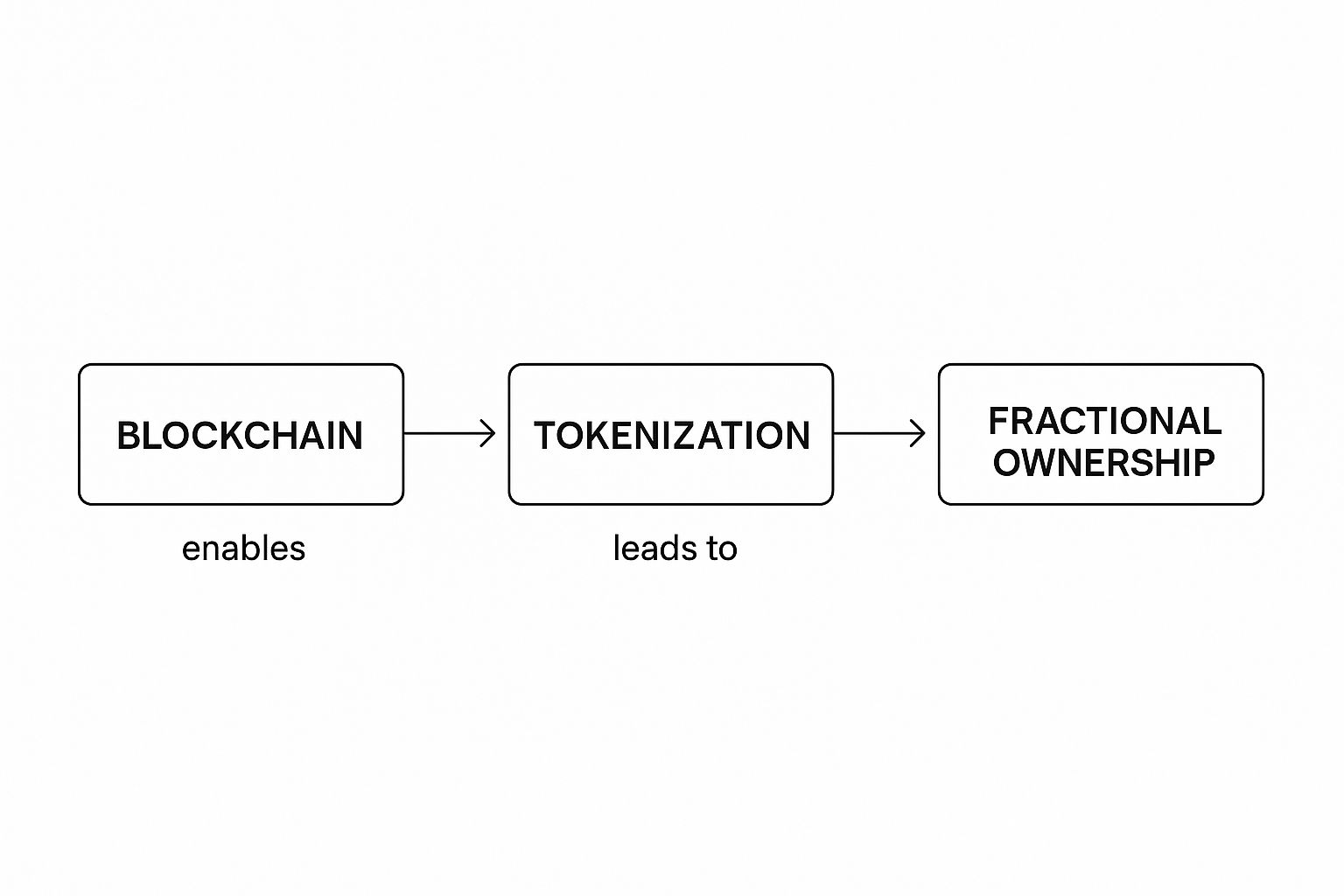
Crypto for Real Estate: Transforming Property Investments
Using crypto for real estate isn't just a futuristic idea anymore—it's happening right now, completely changing how we buy and sell property. This evolution allows buyers and sellers to close deals faster and with fewer middlemen, signaling a major shift in how assets change hands around the world.
The New Reality of Property Transactions

The thought of buying a house with digital currency might sound complicated, but the basic idea is surprisingly simple. Remember when we switched from writing paper checks to using online banking? It felt strange at first, but soon became the norm because it was just so much more convenient and efficient. Using crypto for real estate is a similar leap forward, offering a modern-day alternative to outdated financial systems.
This trend is growing because people are looking for more direct, secure, and global ways to handle transactions. A typical property sale involves a whole parade of intermediaries—banks, escrow agents, and title companies. Every single one adds more time and more cost to the deal, creating a slow and frustrating process for everyone involved.
Why Digital Currencies Are Gaining Ground
Digital currencies turn this entire process on its head by allowing for peer-to-peer transfers. This means money can move directly from a buyer’s digital wallet to a seller’s, often sidestepping the clunky banking infrastructure that slows everything down. Crypto is creating a whole new reality for property deals and is part of a bigger conversation about how innovative models are redefining real estate transactions globally.
This direct path to payment is grabbing the attention of the property market for a few key reasons:
- Serious Speed: Crypto transactions can be finalized in minutes or hours. That's a world away from the days—or even weeks—it takes for traditional bank wires and clearances to go through.
- Lower Costs: When you cut out the middlemen, you also cut out their fees. Bank charges, currency conversion fees, and processing costs can be dramatically reduced.
- Rock-Solid Security: Every transaction is etched onto a blockchain, which is essentially a decentralized and permanent digital record book. This creates a transparent and highly tamper-proof history of payment.
A Global Marketplace Without Borders
Perhaps the biggest advantage of using crypto in real estate is its ability to erase geographical lines. International investors often hit a wall with currency exchange rates, steep wire transfer fees, and conflicting banking rules. These headaches can easily delay a deal or kill it altogether.
With a universally accepted digital currency like Bitcoin or a stablecoin tied to the US dollar, an investor in Asia can buy a property in Europe as easily as if they were buying it next door.
This borderless approach opens up the property market to a much larger pool of buyers, which means more liquidity and better opportunities for sellers. This is about more than just a new way to pay; it's about building a more connected and accessible global real estate market. Getting to grips with this new playing field is becoming crucial for anyone in the property game.
How Crypto and Real Estate Actually Work Together
To really get how crypto for real estate works, it helps to think of the blockchain—the tech behind it all—as a shared digital ledger. In a typical property sale, you have a bunch of different people (buyer, seller, agents, lawyers) all keeping their own separate paperwork. It can get messy. With blockchain, everyone involved in the deal shares a single, transparent record that can't be secretly altered.
This shared ledger becomes the single source of truth, cutting down on confusion and building a foundation of trust. When it comes to actually using this tech to buy a house, there are generally three ways people are doing it. Each one offers a different spin on using digital money, depending on what you're comfortable with.
Direct Crypto Payments for Property
The most straightforward way is to simply pay for the property directly with a well-known cryptocurrency like Bitcoin (BTC) or Ethereum (ETH). It’s a lot like a wire transfer, but instead of sending dollars from a bank account, the buyer sends crypto from their digital wallet straight to the seller's.
This is a popular route for early crypto adopters and investors who already have a lot of their wealth in digital assets. Paying directly means they don't have to cash out their crypto into traditional money first, which can be a real headache come tax time. Plus, the whole transaction is logged on the blockchain, creating a permanent and public proof of payment.
The big catch, however, is volatility. The value of Bitcoin and Ethereum can jump up or down in a matter of hours. Imagine agreeing on a price, but by the time the deal closes, the crypto’s value has tanked. The seller could end up with far less than they bargained for, which is a massive risk for everyone.
Using Stablecoins for Price Stability
To get around that volatility problem, many real estate deals are now turning to stablecoins. These are a unique kind of crypto specifically designed to hold a steady value because they’re tied to a stable asset, usually the U.S. dollar. Just think of a stablecoin as a digital dollar—one token is meant to always be worth one dollar.
Using stablecoins like USDC or USDT gives you the best of both worlds:
- The Speed and Security of Blockchain: Your transaction is fast, can be sent anywhere in the world, and gets recorded on that unchangeable ledger.
- The Stability of Fiat Currency: The value doesn't swing wildly, so the buyer and seller both know the exact financial value of the deal from start to finish.
This approach has quickly become the preferred method for crypto real estate deals because it takes all the financial guesswork out of the equation. You keep all the benefits of the technology without the heart-stopping price swings. This payment model is popping up everywhere, not just in property, as you can see in our guide on how crypto is redefining ecommerce transactions.
Property Tokenization and Fractional Ownership
Now for the really groundbreaking stuff: property tokenization. This is the process of taking the ownership rights of a real-world property and converting them into digital tokens on a blockchain. Picture a $1 million apartment building being divided into one million digital tokens. Each token represents a tiny, ownable piece of that building.
Tokenization essentially turns a physical, hard-to-sell asset into a bunch of liquid, easily traded digital shares. It’s like turning a building into a stock you can buy and sell in small pieces online.
This opens the door to something called fractional ownership, letting multiple investors chip in and co-own a property without the legal nightmare of traditional partnerships. An investor could buy just a few tokens, giving them a real stake in a high-value property they could never afford to buy outright.
This diagram shows how blockchain is the essential foundation that makes tokenization, and in turn, fractional ownership, possible.

As you can see, without that secure, decentralized ledger that a blockchain provides, creating and trading digital property shares just wouldn't work.
Tokenization makes real estate investing more accessible and liquid than it has ever been. Investors can buy and sell their property tokens on secondary markets almost as easily as trading stocks, bringing a whole new level of flexibility to an asset class that's famously rigid. This is what's truly changing the game for property ownership.
The Real Benefits of Using Crypto in Property Deals

So, why are savvy buyers and sellers even considering using crypto for real estate? The appeal goes far beyond the novelty. When you strip away the hype, you find a set of powerful, practical advantages that directly address some of the oldest frustrations in property transactions.
The core benefits really come down to making deals faster, cheaper, and more secure. Imagine completing a property purchase in the time it normally takes just to get the initial paperwork approved. That’s the kind of efficiency we’re talking about.
Drastically Reduced Closing Times
In a traditional property sale, the clock seems to tick in slow motion. Funds have to crawl through a maze of banking systems, wire transfer protocols, and escrow accounts, often taking weeks to finally clear. This agonizing waiting period is not only stressful but also introduces risks, like a deal falling through at the last minute.
Cryptocurrency transactions, on the other hand, operate on a global, 24/7 network. A payment can be sent from a buyer’s digital wallet and confirmed in the seller’s wallet in a matter of minutes or hours, not days or weeks. This incredible acceleration means the entire closing process can be condensed significantly, letting both parties move on much faster.
Slashing Transaction Costs and Fees
Let’s be honest: every hand that touches the money in a real estate deal takes a cut. Bank wire fees, escrow service charges, and currency conversion costs for international deals can easily add up to thousands of dollars. These intermediary fees are often just accepted as an unavoidable cost of doing business.
Crypto offers a much more direct path. By enabling peer-to-peer transfers, it simply removes many of these middlemen from the equation. The result? A sharp drop in associated costs. While blockchain networks do have transaction fees (often called "gas fees"), they are frequently far lower than the combined percentage-based fees charged by traditional financial gatekeepers.
A direct comparison shows a clear winner in efficiency. While a traditional international wire transfer might cost 1-3% and take several days, a stablecoin transaction can cost a fraction of a percent and settle in minutes.
For businesses and individuals alike, learning how to accept cryptocurrency payments for your business can unlock these significant cost savings and improve cash flow.
To see just how different these two approaches are, let's break it down.
Traditional Vs Crypto Real Estate Transactions
The table below gives a side-by-side look at how a crypto-powered deal stacks up against a conventional one.
| Feature | Traditional (Fiat) Transaction | Crypto Transaction |
|---|---|---|
| Transaction Speed | Days to weeks | Minutes to hours |
| Associated Costs | High (bank fees, wire fees, conversion) | Low (network fees only) |
| Operating Hours | Restricted to banking hours | 24/7/365 |
| Global Access | Complex and slow | Seamless and borderless |
| Transparency | Opaque, private ledgers | Public, immutable blockchain record |
| Intermediaries | Multiple (banks, escrow, payment processors) | Minimal (peer-to-peer) |
As you can see, the differences are stark. Crypto streamlines nearly every aspect of the financial exchange, from speed to cost.
Unlocking Global Markets with Ease
Perhaps one of the most powerful benefits of using crypto in real estate is its truly borderless nature. For an international investor, buying property abroad is often a bureaucratic nightmare filled with currency conversion headaches, high exchange rate markups, and regulatory hurdles between different banking systems.
Think about an investor in Japan wanting to buy a vacation home in Portugal. Instead of navigating two separate, complex financial systems, they could use a stablecoin like USDC. The transaction bypasses international banking routes entirely, making the purchase as straightforward as if it were local. This simple change opens up properties to a massive global pool of buyers who were previously put off by all the financial friction.
Enhanced Security and Transparency
Finally, every crypto transaction is permanently recorded on the blockchain. This public, unchangeable ledger acts as a built-in verification system. It provides indisputable proof that a payment was sent from one party to another, adding a layer of transparency that traditional banking systems, with their private ledgers, simply can't match.
Once a transaction is confirmed on the blockchain, it cannot be reversed or altered. For sellers, this dramatically reduces the risk of payment fraud and chargebacks, offering a level of finality that is hard to achieve in the conventional system.
Navigating the Hurdles and Challenges
While the idea of using crypto for real estate is exciting, let's be realistic. It's not a perfectly smooth road just yet. Anyone jumping in needs to have their eyes wide open to the obstacles. Knowing about the potential bumps ahead is the best way to make sure your transaction doesn't go off the rails.
To successfully pull off a crypto property deal, you have to get a handle on four main things: wild market swings, murky regulations, security threats, and the simple fact that most people are still new to this. If you tackle these head-on, they stop being deal-breakers and just become part of the process to manage.
Taming Crypto Price Volatility
The first thing everyone worries about is the price. And for good reason. The value of cryptocurrencies like Bitcoin and Ethereum can jump or tank in the blink of an eye. Just imagine you agree to sell your house for 10 Bitcoin, feeling great about the price. But what if its value drops 15% before the paperwork is finalized? That’s a massive loss no seller is going to accept.
This is exactly why stablecoins have become the hero of crypto real estate. They are a special type of crypto designed to hold a steady value because they’re tied directly to a stable asset, usually the U.S. dollar. Think of coins like USDC and USDT.
Using stablecoins gives you the best of both worlds:
- Speed: You still get the incredible transaction speed that blockchain offers.
- Stability: The final sale price is locked in. The seller gets exactly what they were promised, down to the penny.
When a deal is structured with stablecoins, both the buyer and seller can breathe easy, knowing the financial ground beneath them is solid.
The Evolving Regulatory Landscape
Let's be blunt: the rules for crypto are still a work in progress. They change drastically depending on where you are, not just from country to country but sometimes even from one state to the next. This creates a fog of uncertainty around critical things like property taxes, capital gains, and anti-money laundering (AML) laws.
Trying to figure this out on your own is a huge mistake. You absolutely need to bring in professionals who live and breathe this stuff.
Getting a lawyer who specializes in both digital assets and real estate law isn't just a good idea—it's non-negotiable. They are the only ones who can structure the deal properly, ensuring you're compliant with every local and national rule and protecting you from legal time bombs.
An expert will make sure all the paperwork and reporting are handled correctly, keeping the transaction clean and transparent. A little foresight here prevents a world of hurt later.
Securing Your Digital Assets
In crypto, the saying "be your own bank" is true. It’s empowering, for sure, but it also puts all the responsibility squarely on your shoulders. The digital wallets that hold your crypto can be prime targets for scammers, hackers, and phishing schemes. One slip-up, one clicked link, and your funds could be gone forever with no way to get them back.
This means your security habits have to be rock-solid. We're talking about using hardware wallets (which are like fortified USB drives that keep your crypto offline), setting up two-factor authentication (2FA) everywhere you can, and developing a healthy paranoia about suspicious emails or messages.
For a transaction as big as a real estate deal, it's also smart to do a small test run first. Send a tiny fraction of the crypto to the recipient’s wallet address before you transfer the full amount. This simple check confirms everything is correct and can prevent a very expensive typo.
Overcoming the Knowledge Gap
Finally, you have the human element. The truth is, most real estate agents, lawyers, and home buyers are still wrapping their heads around blockchain and digital currency. This learning curve can cause hesitation, create confusion, or make people dismiss the idea of a crypto deal out of hand.
The solution here is patience and education. Real estate pros who invest the time to learn this new technology can become invaluable guides for their clients. It's all about breaking down the concepts into simple terms, pointing people to clear resources, and patiently walking them through each step. That’s how you build the trust needed to get a deal like this done. As more people get comfortable, this challenge will fade, opening the door for crypto to become a more common sight in real estate.
The Real Game-Changers: Tokenization and Smart Contracts

While paying for a house with Bitcoin is interesting, the truly profound shift in real estate comes from two other concepts: tokenization and smart contracts. We're moving beyond simple one-time payments and into a world where these technologies fundamentally change how we own, manage, and trade property. This is the next frontier.
Think of tokenization like this: you're converting a physical asset into digital shares, almost exactly like a company issuing stock. A single, pricey apartment building is a great example. Instead of one person needing to buy the whole thing, tokenization can divide its ownership into thousands of digital tokens recorded on a blockchain.
Suddenly, each token represents a small, verifiable slice of that building. What was once a static, multi-million-dollar asset that took months to sell is now as liquid and tradable as a share of Apple stock. This isn't just a new way to pay; it's a complete reimagining of what real estate investment can be.
Opening the Doors to Real Estate Investment
This whole process of "digitizing" property ownership blows the doors wide open for fractional ownership. Traditionally, getting a piece of high-value commercial or residential real estate was a game reserved for big institutions or the ultra-wealthy. The average person was simply priced out.
Tokenization completely shatters that barrier. You no longer need millions to buy a property; you can purchase a few tokens for a fraction of the cost. An exclusive asset class becomes accessible to a much broader audience, injecting new life and energy into the market.
This newfound accessibility brings some fantastic benefits:
- Smarter Diversification: Everyday investors can finally diversify their portfolios by owning a piece of a high-end property, something that was totally out of reach before.
- Pinpoint Investing: You can buy tokens for a specific building you believe in, rather than throwing money into a generic, faceless real estate fund.
- Unmatched Liquidity: Need to sell your stake? Just trade your tokens on a digital marketplace. This offers a level of flexibility that traditional property sales could never match.
The core idea is simple but powerful: tokenization lets you own a piece of a building, not the whole thing. It turns a slow, clunky asset into something fast, divisible, and easy to trade.
To get a better handle on the underlying tech, exploring various blockchain applications is a great starting point. Once you understand the building blocks, it’s much easier to see how these advanced concepts work. And if you're new to the lingo, our guide on what a token is in cryptocurrency can help clear things up.
Automating Trust with Smart Contracts
The other half of this powerful duo is the smart contract. Forget stacks of paper and legal jargon. A smart contract is a self-executing agreement where the terms are written directly into code on a blockchain. It’s like a digital vending machine for real estate deals.
Imagine a contract that automatically performs an action once a specific condition is met, with no human intervention needed. For example, a smart contract could be coded to instantly transfer the property's digital title (the tokens) from the seller to the buyer the moment it confirms the buyer's funds have been received.
This kind of automation cuts out expensive middlemen like escrow agents and banks. The code itself enforces the rules of the deal, making the entire process faster, cheaper, and far less susceptible to human error or delays.
When you put tokenization and smart contracts together, you can manage the entire lifecycle of a real estate transaction right on the blockchain. This integration doesn't just make the deal happen faster; it also creates a transparent, unchangeable record of every single step, from the initial offer to the final transfer of ownership.
Real-World Adoption and Emerging Trends
The idea of buying a house with crypto isn't just a futuristic fantasy anymore—it's happening right now. All over the world, property listings are starting to pop up that welcome digital currency payments, showing this is a genuine shift, not just a fleeting trend. The push is coming from a new wave of buyers and the essential market infrastructure that’s finally catching up.
You can really see this taking hold in luxury and international property markets. Tech-savvy millennials and global investors, who are already at home with digital assets, are at the forefront. They appreciate the speed and directness crypto brings to the table, especially for cross-border transactions where traditional banks often throw up roadblocks and cause delays.
The Numbers Behind the Movement
This isn't just talk; the data backs it up. By early 2025, cryptocurrency had become a serious contender in property deals, particularly in the high-end market. In the United States, for instance, an estimated 7–10% of listings now offer a crypto payment option. This has already translated into roughly $1 billion worth of property sales paid for with digital currencies—a clear signal that the market is changing.
But this growth is about more than just accepting Bitcoin for a down payment. A whole new ecosystem is springing up to make these deals work, cementing crypto's place in the real estate world.
The rise of supporting services is a clear sign of market maturity. We are now seeing the emergence of crypto mortgage platforms, on-chain financing options, and tokenized ownership services, all designed to integrate seamlessly into property deals.
Emerging Infrastructure and New Models
The real engine behind this movement is the new infrastructure being built. Companies are developing platforms that make it simpler and safer for sellers to take crypto and for buyers to spend it. We're seeing everything from specialized payment gateways to firms that help navigate the legal side of tokenized property titles.
As the industry matures, we're also seeing new models that are pushing the envelope. You can dive into innovative real estate initiatives like EmpireDAO to see how decentralized organizations are getting into the game. These are the kinds of developments that suggest a future where crypto isn't just for luxury homes but becomes a standard choice for everyday properties, making the entire market more open and efficient for everyone.
Common Questions About Crypto for Real Estate
Dipping your toes into the world of crypto for real estate is bound to bring up a few questions. It’s a new frontier, after all. Getting straight answers is the best way to feel confident about moving forward.
Let's walk through some of the most common things people ask. Think of this as the essential "need-to-know" breakdown covering legality, taxes, and how a business can actually start taking crypto for property sales.
Is It Legal to Buy Property with Cryptocurrency?
In short, yes. It's generally legal to buy real estate with cryptocurrency in many places, including the United States. But here’s the important catch: the rules of the road aren't the same everywhere. The legality and the specific hoops you need to jump through can change quite a bit from one country to another, and even between states.
The main thing to remember is that while the payment method is new, all the old rules still apply. Every transaction has to follow existing property laws, anti-money laundering (AML) regulations, and Know Your Customer (KYC) identity checks.
The single most important thing you can do is your homework. You absolutely need to talk to a legal professional who knows the ins and outs of both real estate law and digital assets. This ensures the deal is buttoned up and compliant with local rules.
Getting that expert advice makes sure the title transfer is clean and everyone involved is protected, which helps you sidestep major legal headaches later on.
How Are Taxes Handled in a Crypto Real Estate Deal?
This is where things can get tricky, and you really need to pay attention. Most tax agencies, like the IRS in the US, don't see cryptocurrency as money—they see it as property. That single distinction changes everything about how these deals are taxed.
When you use crypto to buy a house, you’re technically "selling" your crypto. If the crypto has gone up in value since you first got it, you’ve made a profit, and you'll likely owe capital gains tax on that increase.
Let's look at a quick example:
- Say you bought 10 Bitcoin a while back for $100,000.
- Today, you use those same coins, now worth $500,000, to purchase a property.
- In the eyes of the taxman, you just realized a $400,000 capital gain, and that's a taxable event.
The seller has their own tax situation to figure out, based on receiving a $500,000 asset. Because this is so complex and the stakes are high, getting advice from a tax professional who specializes in digital assets isn't just a good idea—it's essential.
What’s the Easiest Way to Accept Crypto?
If you're a real estate agency or title company that wants to start accepting digital currencies, you don’t have to become a blockchain wizard overnight. The simplest and safest route is to use a cryptocurrency payment gateway. These services do all the heavy lifting for you.
Instead of you having to manage crypto wallets and wait for blockchain confirmations, a payment gateway creates a smooth checkout process. It can even convert the crypto payment into regular money (like USD or EUR) right away, which protects the seller from the wild price swings crypto is known for. It's really the best of both worlds—you get the benefits of offering a new payment option without the headaches and risks.
Ready to make crypto payments simple for your real estate business? BlockBee offers a secure, non-custodial payment gateway that lets you easily accept over 70 different cryptocurrencies. Our tools give your clients modern payment choices with instant confirmations and payouts sent directly to you. Get started with BlockBee today.
